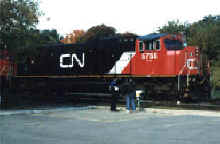|
|
A Novice's Guide to Railscanning
Introduction
First of all, I should re-iterate that I am by no means an
expert or an authority on the topic. My suggestions are merely that -
suggestions. If you have anything that you want to add to what I have here, then
by
all means e-mail me and I'll do my best to add to/change what I have here to
better serve the people who read the site. The best way to learn is to get out
and do it - theres nothing that I could write here that would help
you more than experiencing it for yourself. Most (if not all) of hobbyists
are friendly and helpful, and can answer most of the questions you may have.
Don't be afraid to strike up a conversation with someone trackside, and don't be
afraid to ask questions!
merely that -
suggestions. If you have anything that you want to add to what I have here, then
by
all means e-mail me and I'll do my best to add to/change what I have here to
better serve the people who read the site. The best way to learn is to get out
and do it - theres nothing that I could write here that would help
you more than experiencing it for yourself. Most (if not all) of hobbyists
are friendly and helpful, and can answer most of the questions you may have.
Don't be afraid to strike up a conversation with someone trackside, and don't be
afraid to ask questions!
And remember, the internet is always a VALUABLE source for information!
Step one - Getting a Scanner
Railway operations generally occur in the 160 MHz
band of the radio frequency spectrum, so getting a scanner
shouldn't prove difficult. Any scanner from any era should be able to pick up
all of the frequencies that you might need.
Also, if you already have a scanner, its probably best to skip this part.
First, you need to assess your financial situation: basically, what can you afford?
New or used? How many channels? What about coverage? Antenna? Other uses? No
matter what you choose, expect to spend over $100. Used scanners start at around
that - New ones will run you over $200-250, sometimes even as high as a few
thousand! Typically, the best bet for new users are Radio Shack scanners. I started out
with a 10-memory Pro-42 I found at Cash Converters. It fit my needs quite well,
and eventually moved up in price range and complexity. Say what you will about
Radio Shack, their scanners are pertty decent, and are easy to use.
Scanners usually come in
four flavors:
 |
 |
 |
 |
| Handheld |
Mobile (car based |
Base (tabletop) |
Computer Based |
More details on these on the next page . . .
 Next
Page Next
Page
|